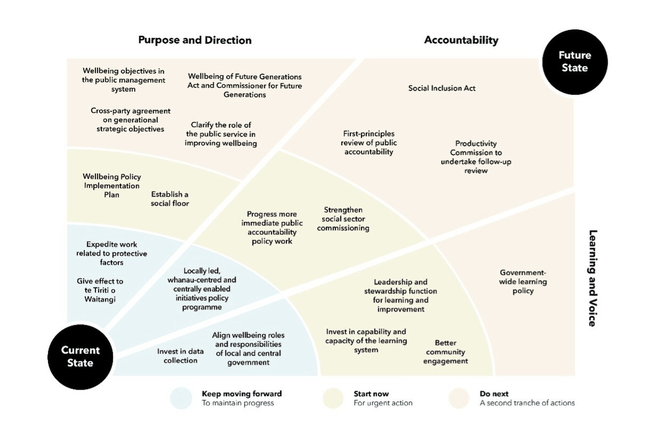Since 2021, we have focused our engagement effort on New Zealand scale initiatives which are also motivated by the search for insight into root causes to some of our wellbeing challenges, and where there is a movement for change in the way wellbeing is led, funded and delivered. This has seen us focus on two major pieces of work:
· Productivity Commission: A Fair Chance for All- breaking the cycle of persistent disadvantage (Productivity Commission | A fair chance for all); and
· The Future of Local Government in New Zealand – a review to explore opportunities to create a new system of local governance and democracy that will effectively respond to a changing New Zealand and create conditions for communities to thrive (Home | Review into the Future for Local Government Review into the Future for Local Government).
The Waikato Wellbeing Project engaged with both of these initiatives, including via formal submissions to discussion documents and draft reports. These have been summarised in previous WWP updates. We were really pleased to see the WWP’s thoughts acknowledged and quoted in both documents, along with those from many other community leaders and leadership groups in New Zealand.
The major findings and recommendations from each of these reviews are summarised below.
A Fair Chance for All
The Current Situation: Key Findings
1. Close to one-fifth of New Zealanders experienced persistent disadvantage in both 2013 and 2018
2. Persistent disadvantage is a systemic problem
3. There is often a narrow focus on economic growth and material prosperity
4. Some values are emphasised over others
5. The system struggles to recognise or account for the full range of impacts on wellbeing when making decisions
6. The current system is overly focused on short-term outcomes and struggles to consider the future
7. The system often fails to respond to people experiencing multiple challenges at the same time
8. The system does not pay enough attention to the distribution of wellbeing across individuals, families, whānau and communities
9. A clearer system purpose and direction for wellbeing is needed
10. Public accountability settings need to be re-focused to support locally led, whānau-centred and centrally enabled approaches; and
11. The public management system needs to become a learning system
The way forward
The report made a series of recommendations to the Government, summarised in the following diagram.
The final report can be found here: Productivity Commission | Foreword
Future for Local Government Review
The final report from the panel concluded that quality local governance is critical to navigate the challenges we face over the next 30 years and ensure people, place, and the environment thrive.
Local government must play a critical role in building place-based resilience that supports communities through the times ahead. This will not be possible under the current system of local government, which faces significant financial pressures, strains on capacity and resourcing, fragmented relationships with central government, and an uncertain mandate to fulfil its purpose.
The panel concluded there are no simple solutions to the problems with the current system. Historically, the local government sector only makes significant change when central government imposes its will through significant reform.
The report concluded that local government has the opportunity to determine its own future and lead the reform process. This will require a major shift for central government as well. Agencies and ministers must adapt how they operate and relate to local government and enable the change through commitment and resourcing.
The key recommendations of the report were:
· Local government needs certainty about its mandate. The Panel considers the legislative purpose of local government as set out in the Local Government Act 2002 (LGA) is appropriate
· Local government needs to further embrace Te Tiriti o Waitangi and te ao Māori. The system needs to honour and give effect to Tiriti-based partnerships between local government and Māori.
· Local and central government need to align on place-based priorities and coinvest in mutually agreed outcomes
· Funding for local government should rely on rates, a range of new tools to raise revenue locally and significant central government funding to support locally specific wellbeing outcomes.
· Local democracy needs strengthening- the threshold for Māori wards needs to be reduced,
councils need to enable iwi and hapū who want to participate in local governance. Councils need to attract diverse and capable candidates with a broad range of skills. Elected
members need to be valued, supported, and upskilled and 16- and 17-year-olds should be eligible to vote
· A reorganisation of local government. This process must be led by local government and supported by central government. It will include a redesign of councils’ operating models, new approaches to leadership, and new council structures
· New culture, mindsets, and leadership approaches, including more innovation, experimentation, and learning along with collaborative approaches to solving problems.
· Guidance and signposting is needed on the reform process, including resource management and affordable water. The Panel urged local and central government to get started immediately.


